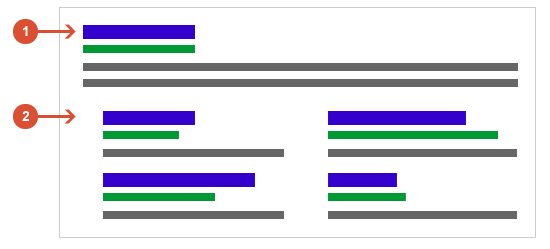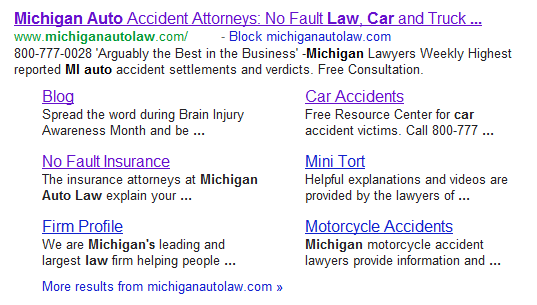In February, Google announced 40 changes reported, a new record for their monthly series on search quality.
As you know, SEO for lawyers is different from SEO for just about every other business. While many of these changes probably won’t have much of an impact on your law firm’s online marketing, there are a couple worth consideration.
More coverage for related searches.
Google has added a new data source to help them generate the “Searches related to” section. They report that this change will cause the related search feature to appear for more queries.

With regard to your law firm internet marketing, increased frequency of related searches means additional opportunity for keyword targeting.
Like Google Suggest, related search can provide key insights for keyword discovery. In the above example, Google provides 6 additional queries related to chicago injury lawyers. These might be keyword phrases that you want to add to your target lists.
Tweak to categorizer for expanded sitelinks; Less duplication in expanded sitelinks.
Google reports that these improvements will generate more relevant sitelinks and reduce duplication in the snippets for expanded sitelinks. For those that don’t know, sitelinks are the links shown below some of Google’s search results that are meant to help users navigate your site from the search results page:

Here is a real-world example of a law firm for which Google is displaying sitelinks:
As you can see, sitelinks provide for a lot more real estate on results pages. You can also help Google manage your sitelinks via Webmaster Tools.
For your law firm, sitelinks can help motivate searchers to click on your links. Having sitelinks that include testimonials pages, honors and awards, and offering consultations, can help attract clicks that you might not otherwise have received. And of course, these sitelinks push your competition down the page.
More locally relevant predictions in YouTube.
Google also reports that they have improved the ranking for predictions in YouTube to provide more locally relevant queries. The example that they provide is a query [lady gaga in ]. On the US version of YouTube, they might predict [lady gaga in times square], but for the same search performed on the Indian version of YouTube, we might predict [lady gaga in India].
Online video is a powerful marketing medium for lawyers, when executed professionally. Pretty good quality video can be produced at a more affordable cost than ever before.
Google has made it clear that they believe that a more video-centric web is the future. And this update is just one example. Don’t forget to optimize your videos. In light of this update, you should be especially mindful of optimizing videos for local.
Improvements to freshness.
Google has applied new signals which help them serve fresh content. For webmasters, I’m not sure that this really changes all that much. Continue to put forth your best content as frequently as possible. Don’t leave your site/blog stagnant. It makes it less valuable to users, and thereby, less valuable to Google.
Improvements to ranking for local search results.
To me, this is one of the most important updates. As reported by Google, they have improved the triggering of Local Universal results by relying more on the ranking of our main search results as a signal.
What does this mean? I interpret it to mean that traditional organic ranking signals are going to play a more important role in gaining visibility for local results. In other words, traditional SEO authority will be more important for local rankings. Which, I think is a good thing.
For law firm webmasters, this means not abandoning traditional SEO strategies, like link attraction. I have seen more and more SEOs advising a shift toward business citations and social sharing. And while there is no doubt that these signals are critical to local success, I don’t think it’s time to dump link building.
Panda update.
Had you forgotten about Panda? Google refreshes data in their Panda system, making it more accurate and more sensitive to recent changes on the web.
I’m not going to go into a lot of detail about Panda here. But yet another update demonstrates that Google likes the impact of Panda and is committed to keeping it fresh.
If you’ve been victimized by Panda, you probably need to take a step back and ask yourself some difficult questions about how you are approaching web marketing for your firm.
Are you buying crappy marketing content? Have you sacrificed quality for quantity?
Link evaluation.
This was another pretty significant update. Although it probably shouldn’t have too much of an impact on your actual strategy. Google uses characteristics of links to help them figure out the topic of a linked page. They have changed the way in which they evaluate links and have turned off a method of link analysis that they have used for several years.
While this change may be significant in terms of how Google analyzes link signals, unless you’re into some pretty heavy link signal gaming, you probably don’t need to alter what you’re already doing.
Spam update.
Google reports that they have found and fixed some weaknesses in their spam protections. Uh, yeah. As anyone that works in internet marketing in legal knows, there are still quite a few weaknesses in their spam protections. Will this update be the reciprocal linking resource page killer for which we’ve been waiting? Well I’m writing this on March 20th, and no luck yet.
However, there’s another spam update coming down the pike. So, for now, fingers crossed.
Improved local results.
Another important update to local includes Google’s launch of a new system to find results from a user’s city more reliably.
To me, in my small neck of the web, local search marketing is one of the most effective strategies that local law firms can use. It’s extremely targeted and often not as competitive as traditional organic and paid search results.
For many consumer-facing law firms, people that use the internet to look for law firms will be attracted to local results. Localization of search results is a good thing for users and so it stands to reason that Google’s results will continue to make local a priority. Therefore, so should you.

